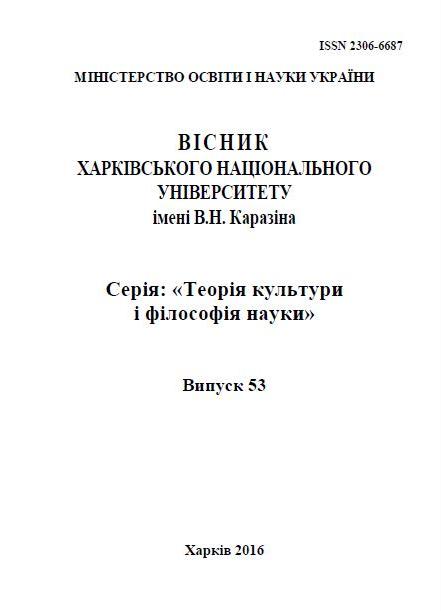The category of irony: Nietzshe’s philosophical analysis
Abstract
The article is devoted to philosophical research of irony category, which is proposed to review as cultural context figure, representing the substitution of existing sense by hidden one, and fixing the interruption of common perception or communication and intention to sense creation renewal. The transformation of sense in different cultural paradigms allows revealing of such fundamental features of ironical discourse as reflectivity, contrariety, axiologity. The strict definition of culturological and aesthetical terms, close to irony, their specific and interrelation, revels the content of this cultural universal term. The holistic historical and cultural understanding of irony, as human conscience position and human being existential, which indicates to possibility of its’ further establishment, is proposed into article. The cultural transformations of irony term reveal the genesis of its’ philosophical content. The classical metaphysics understood irony as methodological strategy of knowledge acquiring, but modern modality philosophy underlines its’ human measured content. In critique of the absurdity of traditional values systems nihilistic philosopher guided by the desire to destroy it as outdated and build another, which, in his opinion, is more consistent with real life. Nietzshe’s nihilistic irony is an example of extreme disappointment and subjective sustainable metaphysical systems. Non classical interpretation of ironical discourse denies the overpower of logocentrism and rehabilitates the direct human feelings sphere.
Downloads
References
Вандышев В. Н. Философия. Экскурс в историю учений и понятий. – Суми: ВВП “Мрія-1” ЛТД, 1996. – 316 с.
Вандышев В. Н. Философия. Коммуникация. Истина (Философские эссе): Монографія / В.Н. Вандышев, В.С. Сломский. – Суми: Вид-во СумДУ, 2009. – 216 с.
Давыдов Ю. Н. Эстетика нигилизма. – М.: Искусство, 1975. – 271 с.
Микушевич В. Ирония Фридриха Ницше // Логос. – 1993. – №4. – С. 199 – 203.
Ницше Ф. Рождение трагедии из духа музыки // Ницше Ф. Сочинения: В 2 т.: Пер. с нем. – М.: Мысль, 1990. – Т. 1. – С. 47 – 157.
Ницше Ф. Странник и его тень // Ницше Ф. Избранные произведения: В 3 т.: Пер. с нем. – М.: REFL-book, 1994. – Т. 2.– С. 270 – 399.
Шопенгауэр А. Мир как воля и представление / Пер. с нем. – М.: Наука, 1993. – 670 с.




